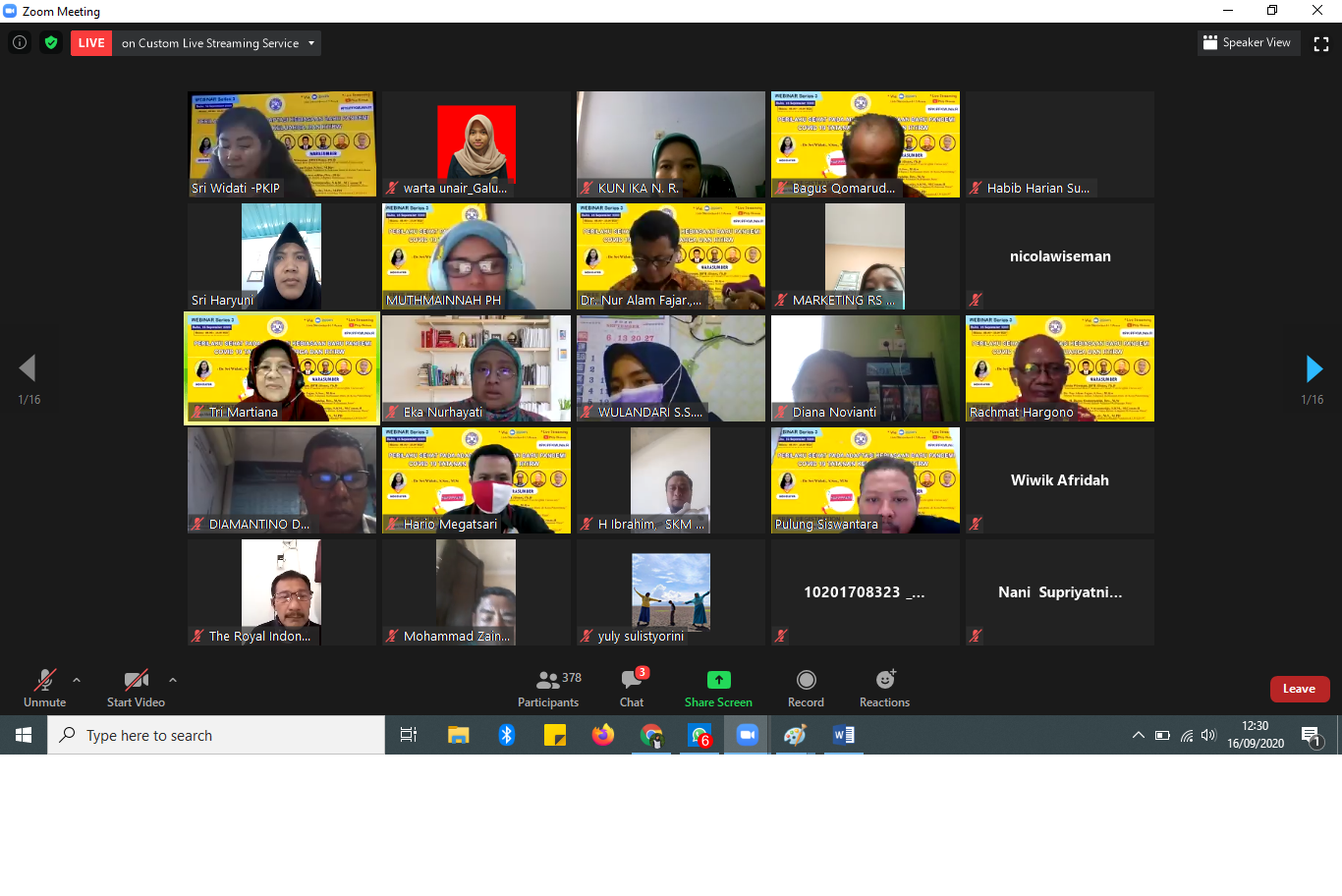UNAIR NEWS – The Department of Health Promotion and Behavioral Change (PKIP), Faculty of Public Health (FKM), UNAIR held three webinars in 2020. The first webinar was held in July 2020, discussing the adaptation of new norms at national level.
In August, a webinar was held again to raise the issue of tackling COVID-19 at city and regency level resulted in a coping strategy. The last webinar was held on Wednesday, September 16, 2020 on healthy behavior in adapting to new habits of COVID-19 pandemic.
Hario Megatsari, S.KM., M.Kes, or known well as Fisto, the Head of Department of Health Promotion and Behavioral Change (PKIP), FKM UNAIR explained that the webinar aims to provide inspiration and solutions to policy makers. Fisto hoped that the results of the webinar can be used as a solution to tackle COVID-19.
“Hopefully the results of the webinar can be applied and used as a solution to the COVID-19 pandemic,” he said.
The following are some of the recommendations and inputs from several speakers in the second and third webinar.
Government as society role model
Oedojo Soedirham, dr., M.PH., M.A., Ph.D. said that the majority of Indonesian population is still paternalistic. So, in socializing the adaptation of new habits as an effort to deal with the COVID-19 pandemic, the role of the government is needed as a role model of society.
“The government and COVID-19 countermeasures must be consistent in adhering to health protocols so that they can be emulated by the society,” said Oedojo.
The lecturer of FKM UNAIR and Head of Surabaya Health City added that if the government and officials commit violations of health protocols in front of the media and the public, it can cause the public to underestimate COVID-19. The public will also be reluctant to comply with health protocols.
“If the government and the officials violate the health protocols, the public will question whether this COVID-19 pandemic serious or not?” he continued.
Addressing health problems first, then the economy
Oedojo explained that the economy is basically based on human movement. When humans move, the economy runs. However, currently, the COVID-19 pandemic has limited human movement, resulting in economic problems.
For this reason, it needs to be addressed first and the government must be serious in dealing with it. The implementation of PSBB (large scale social restriction) needs to be tightened and equipped with strict but educational sanctions.
“Loosening PSBB in a city should also be done slowly, don’t open all locations immediately,” he explained.
Fight stigma with data and facts
Dr. Rachmat Hargono, dr., M.S., M.PH. explained that the stigma of COVID-19 pandemic is currently the biggest enemy for the prevention of COVID-19. Due to the stigma, patients diagnosed with COVID-19 or their family members will go through a complicated procedure, they tend to hide the disease.
If there are COVID-19 patients who hide themselves, or their families hide patients, the chain of transmission will be difficult or even impossible to break. For this reason, stigma must be resisted and fought as best as possible based on data and facts so there are no doubts from the public.
“That way, they will not be afraid but remain vigilant to protect the environment from being exposed to COVID-19,” he explained.
The importance of social solidarity and collective awareness
Dr. M. Bagus Qomaruddin, Drs., M.Sc. explained that social solidarity and collective community awareness are needed to tackle COVID-19 and make the adaptation of new habits in society successful. It can be started from the family.
When families understand COVID-19 well, and behave healthily and apply health protocols, they leave their homes and set an example for other members of communities to comply with health protocols. If the family has strong values, they will stay consistent carrying out health protocols.
“When the family succeeds in socializing the adaptation of new habits to its members, when all family members heave the house, they will become agents of change for the community and the surrounding environment,” explained the lecturer known well as Bagus.
Combating Covid-19 with cultural approaches
Dr. Nur Alam Fajar, S.Sos., M.Kes as Head of PPPKMI South Sumatra explained that overcoming Covid-19 in the community should consider the culture in the local area. For example, among Palembang people there is a strong cultural value, most importantly, I am not disturbed and my family is safe’. For this reason, it is important to formulate a program that is acceptable to the culture.
“Officers must be able to understand the culture of the target area and know who in the community they can work with to make changes,” he said.
The lecturer of Sriwijaya University continued, in the context of advocacy, it is not only done at a high level, such as for officials to make policies. But it can also be done with community leaders, non-governmental organizations, and religious leaders so they are willing to be involved in tackling COVID-19 according to their potential and role in society.
The third webinar conducted by PKIP Department also invited Nicola Wiseman, BPH (Hons), Ph.D from Griffith University Australia to deliver material related to the practice of handling COVID-19 pandemic carried out by Griffith University. Then, there was also Prof.Dr.Soekidjo Notoatmodjo, S.KM., M.Comm.H talking about material related to behavior change communication in adapting to new habits. (*)
Author: Galuh Mega Kurnia
Editor : Binti Q. Masruroh





